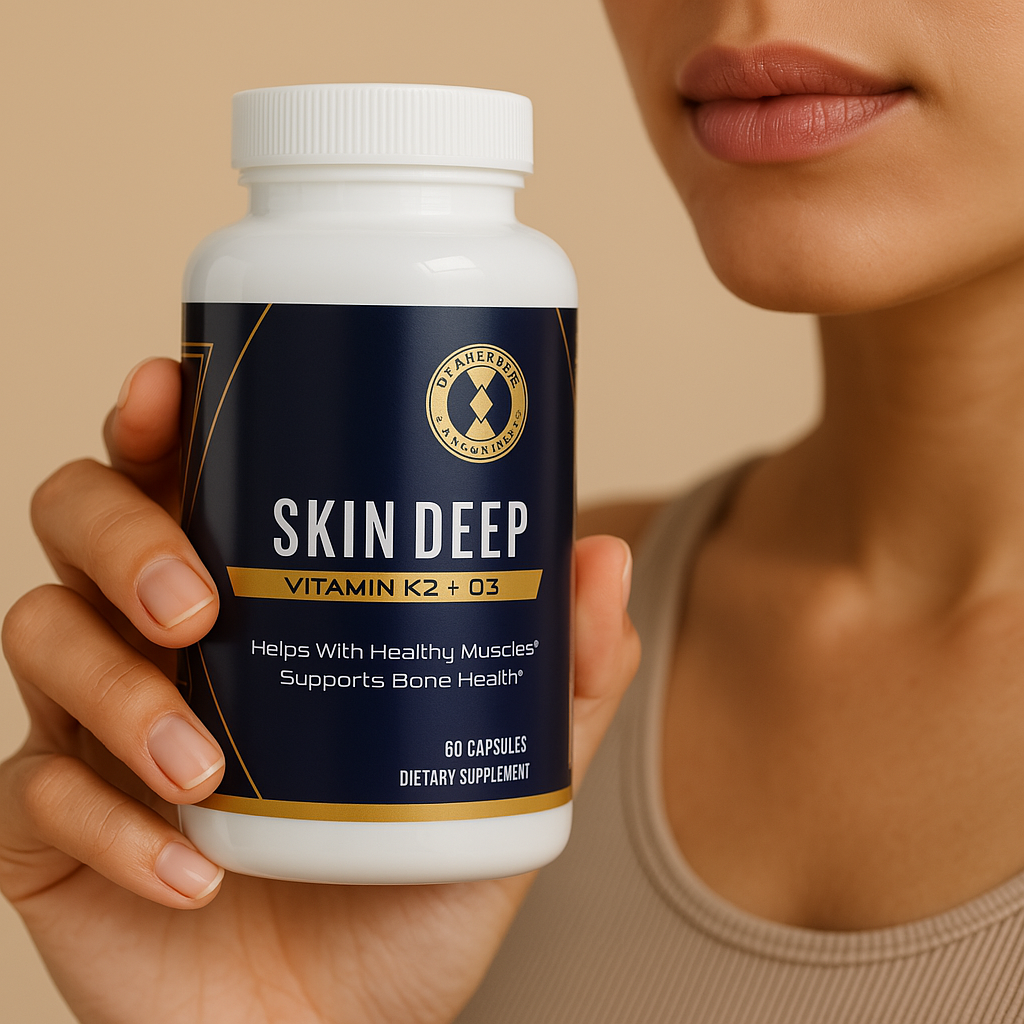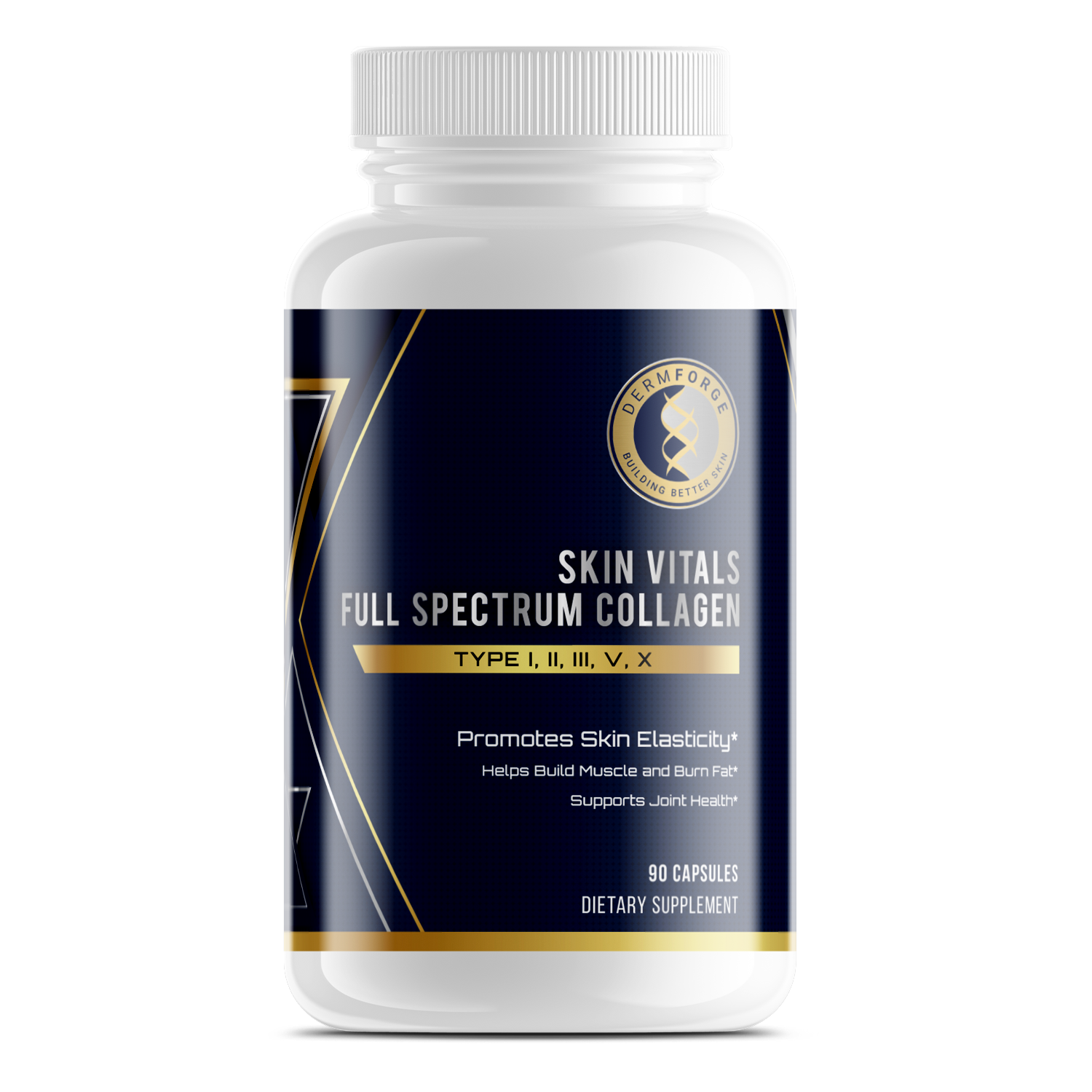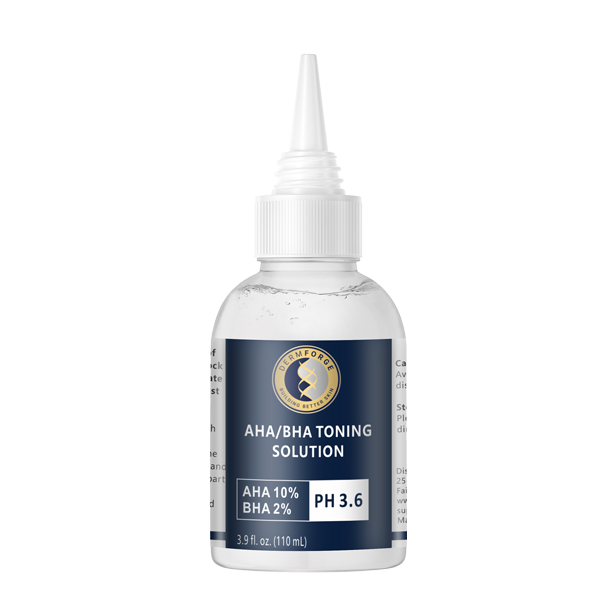Vitamin K2 and D3 have gained attention for their potential to support not only bone health but also skin wellness. Both vitamins play unique roles in your body, yet they work together to deliver meaningful results. Additionally, their combined effects may extend beyond internal health and influence how your skin looks and feels.
However, many people overlook the connection between these nutrients and their skin’s appearance. You might already know that vitamin D3 supports bone strength and immune function. Additionally, vitamin K2 helps regulate calcium distribution, directing it away from soft tissues like arteries and skin.
Together, these nutrients may contribute to smoother, clearer skin by supporting calcium balance and reducing inflammation. Therefore, adding these vitamins to your routine could help you address specific skin concerns. Additionally, when used properly, they may assist in managing dryness, dullness, and loss of elasticity.
However, supplementing safely and effectively requires understanding the correct dosage, ingredients, and usage practices. You should also pair these vitamins with a healthy lifestyle to maximize their benefits. Therefore, learning about their functions and potential impact on your skin can help you make informed choices.
Additionally, small changes to your daily habits can improve the results of your supplement routine. Diet, hydration, and proper skincare practices all play important roles. By combining these efforts, you can give your skin the support it needs to stay healthy and resilient.
Understanding Vitamin K2 and D3
Vitamin K2 and D3 are essential nutrients that play significant roles in maintaining your overall health. Understanding their individual functions can help you appreciate their combined benefits.
Vitamin D3, often called the "sunshine vitamin," is synthesized by your skin when exposed to sunlight. It facilitates calcium absorption in your intestines, supporting bone mineralization and strength. Beyond bone health, vitamin D3 contributes to immune system function and muscle performance. Adequate levels may reduce the risk of certain chronic diseases.
Vitamin K2, a lesser-known nutrient, directs calcium to appropriate areas in your body, such as bones and teeth. It activates proteins that integrate calcium into your bone matrix, enhancing density and reducing fracture risk. Additionally, vitamin K2 prevents calcium from depositing in your arteries, supporting cardiovascular health. This action helps maintain arterial flexibility and reduces arterial calcification.
While both vitamins are crucial individually, their combined action offers enhanced benefits. Vitamin D3 increases calcium availability, and vitamin K2 ensures its proper utilization. This synergy supports bone health and prevents calcium buildup in soft tissues. Incorporating both vitamins into your diet or supplementation routine can promote overall well-being.
How Vitamin K2 Supports Skin Health
Vitamin K2 plays a significant role in maintaining your skin's health and appearance. By directing calcium to the appropriate areas in your body, such as bones and teeth, vitamin K2 prevents calcium from depositing in your skin's elastin fibers. This action helps maintain skin elasticity and may reduce the formation of wrinkles, contributing to a smoother, more youthful complexion.
Additionally, vitamin K2's influence on vascular health can impact the appearance of dark under-eye circles. By preventing calcium buildup in blood vessels, vitamin K2 supports proper blood flow and reduces vascular fragility. This improved circulation may diminish the prominence of dark circles caused by blood pooling under the eyes. Incorporating vitamin K2 into your diet or skincare routine could lead to a more even skin tone and reduced discoloration.
When combined with vitamin D3, vitamin K2's benefits for skin health are further enhanced. Vitamin D3 aids in skin cell growth and repair, while vitamin K2 ensures calcium is utilized effectively, preventing potential skin issues related to calcium mismanagement. Together, vitamin K2 and D3 contribute to maintaining healthy, resilient skin.
Skin Benefits of Vitamin D3
Vitamin D3 plays a significant role in maintaining your skin's health and appearance. By supporting cell turnover, it aids in the removal of old, damaged cells and promotes the emergence of new, healthy ones. This process contributes to a smoother, more radiant complexion. Additionally, efficient cell turnover can help reduce the visibility of fine lines and blemishes, enhancing your skin's overall texture.
Furthermore, vitamin D3 strengthens your skin's barrier function, which is essential for retaining moisture and protecting against environmental aggressors. A robust barrier minimizes water loss, helping to prevent dryness and sensitivity. This reinforcement is particularly beneficial if you experience skin conditions characterized by impaired barrier function.
When combined with vitamin K2, vitamin D3's benefits for skin health are further amplified. While vitamin D3 promotes cell renewal and barrier integrity, vitamin K2 supports proper calcium distribution in the skin. This synergy contributes to maintaining skin elasticity and may reduce the appearance of wrinkles.
Incorporating vitamin D3 into your skincare regimen, alongside vitamin K2, can lead to noticeable improvements in skin health. However, it's important to consult with a healthcare professional before starting any new supplement routine.
Synergistic Effects of K2 and D3
Vitamin K2 and D3 work together to support calcium metabolism and enhance skin health. Vitamin D3 increases calcium absorption from your intestines, ensuring adequate levels in your bloodstream. However, without proper regulation, this calcium can accumulate in soft tissues, leading to unwanted calcification. Vitamin K2 activates proteins that direct calcium to your bones and teeth, preventing deposition in arteries and skin. This synergy maintains bone density and reduces arterial stiffness, promoting overall health.
When taken together, Vitamin K2 and D3 may contribute to clearer, more resilient skin. Proper calcium regulation prevents calcification in skin tissues, preserving elasticity and reducing wrinkle formation. Additionally, these vitamins support collagen maintenance, essential for skin's firmness and smoothness. By ensuring calcium benefits your bones without harming your skin, this combination offers a holistic approach to skincare. Including both vitamins in your regimen can enhance skin appearance and overall well-being.
Supplementing Safely: What to Look For
When considering supplements for skin health, it's important to focus on formulations that enhance nutrient absorption. Vitamin K2 and D3 are both fat-soluble vitamins, meaning they dissolve in fat and are best absorbed when taken with dietary fats. Incorporating healthy fats like avocados, nuts, and olive oil into your meals can improve the absorption of these vitamins. Additionally, some supplements include BioPerine, a black pepper extract known to enhance nutrient bioavailability. For example, certain Vitamin K2 and D3 supplements are formulated with BioPerine to improve absorption.
Understanding the appropriate dosages of Vitamin K2 and D3 is essential for supporting skin health. The recommended daily intake of Vitamin D3 varies based on factors such as age, skin type, and geographical location. Generally, adults are advised to consume between 600 to 800 International Units (IU) per day. However, some studies suggest that higher doses may be beneficial, particularly for individuals with low baseline levels. It's important to consult with a healthcare provider to determine the appropriate dosage for your specific needs. For Vitamin K2, a common recommendation is 100 to 200 micrograms daily, especially for individuals over 50 or those with a family history of cardiovascular issues or osteoporosis.
Combining Vitamin K2 and D3 in appropriate ratios can enhance their effectiveness. A commonly recommended ratio is 10 micrograms of Vitamin K2 for every 1,000 IU of Vitamin D3. This balance supports calcium metabolism, which is important for maintaining skin elasticity and overall health. When selecting supplements, look for products that provide these vitamins in the correct proportions and include absorption enhancers like BioPerine. Always choose supplements from reputable brands that offer transparent labeling and have undergone third-party testing to verify quality and potency.
Lifestyle Tips to Maximize Results
Optimizing your body's absorption of Vitamin K2 and D3 involves mindful lifestyle choices. Diet plays a significant role; since both vitamins are fat-soluble, consuming them alongside healthy fats like avocados, nuts, and olive oil can enhance their uptake. Additionally, incorporating foods rich in these vitamins, such as leafy greens for Vitamin K2 and fortified dairy products for Vitamin D3, supports adequate levels. Hydration also contributes to overall nutrient transport and skin health, so maintaining sufficient water intake is beneficial.
Sun exposure is another factor influencing Vitamin D3 synthesis. Your skin produces Vitamin D3 when exposed to ultraviolet B (UVB) rays from the sun. However, factors like geographic location, skin pigmentation, and sunscreen use can affect this process. Moderate sun exposure, such as spending 10-30 minutes outdoors several times a week, can aid in maintaining Vitamin D3 levels. Always balance sun exposure with skin cancer risk by using protection as needed.Y
Complementary skincare practices can further enhance the benefits of Vitamin K2 and D3. Regularly applying broad-spectrum sunscreen protects your skin from UV damage, preserving its ability to synthesize Vitamin D3. Using moisturizers helps maintain the skin's barrier function, preventing dryness and supporting overall skin integrity. Additionally, incorporating gentle exfoliation into your routine promotes cell turnover, revealing healthier skin layers.
By integrating these dietary habits, mindful sun exposure, and skincare practices, you can effectively support the absorption and efficacy of Vitamin K2 and D3, contributing to improved skin health and overall well-being.
Conclusion
Vitamin K2 and D3 work together to support both your skin and overall health. When taken consistently, they may improve calcium metabolism, skin texture, and resilience. However, the full benefits depend on how well your body absorbs and uses these nutrients.
Additionally, your diet plays an important role. Pairing these supplements with healthy fats can support better absorption. Therefore, eating balanced meals improves your chance of seeing noticeable results. Hydration and moderate sun exposure can also help maintain proper vitamin levels.
Complementary skincare matters too. Applying sunscreen, moisturizing daily, and gently exfoliating all support the effects of internal supplementation. Therefore, a combination of internal and external care gives you a more well-rounded approach to skin wellness.
However, results often depend on your individual health, lifestyle, and consistency. You may not see changes overnight, but steady habits often bring gradual improvement. Additionally, working with a healthcare provider can help you fine-tune your supplement routine.
When used properly, Vitamin K2 and D3 may support clearer, healthier-looking skin. However, always pay attention to how your body responds. If needed, adjust your dosage or change brands for better absorption.
By combining smart supplementation with healthy habits, you give your skin a better chance to improve from the inside out. Keep it simple, stay consistent, and allow your routine the time it needs to work.






